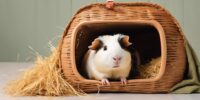How Regular Vet Checkups Can Prevent Common Guinea Pig Diseases
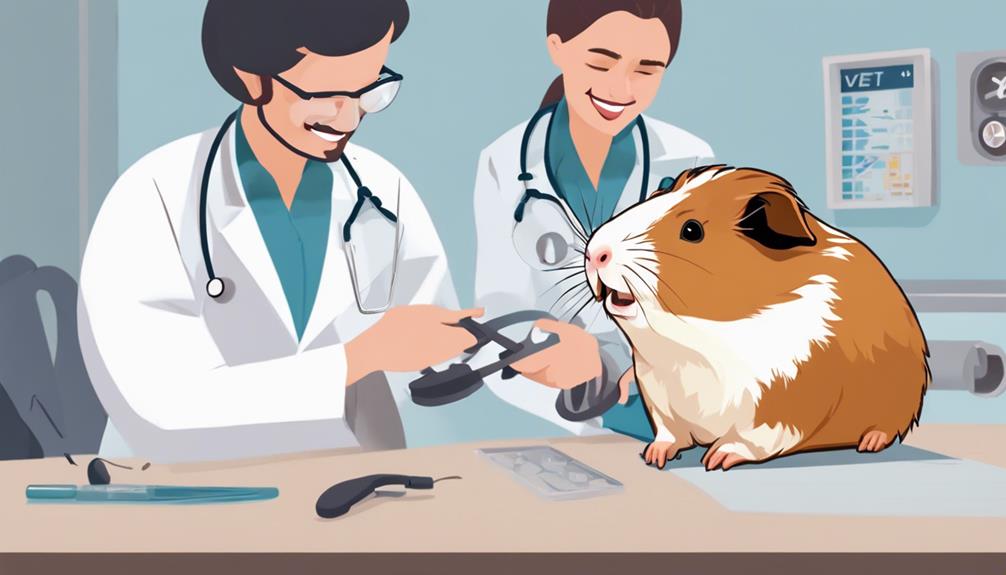
These checkups can help identify health issues early on, increasing the chances of successful treatment. Guinea pigs are prone to respiratory infections, dental problems, and vitamin C deficiency. Regular vet visits can ensure that these issues are caught and treated promptly. It's important to find a vet who is knowledgeable about guinea pig care to provide the best possible treatment for your pet.
Remember, early detection and treatment are key to keeping your guinea pig healthy and happy.
Key Takeaways
- Routine vet checkups aid in early disease detection and prevention.
- Regular monitoring ensures timely interventions for optimal guinea pig health.
- Vet guidance on preventative measures reduces common health risks.
- Timely vaccinations bolster immunity, safeguarding against prevalent illnesses.
Importance of Regular Checkups
Regular checkups are essential for ensuring the overall health and well-being of guinea pigs. These furry companions have specific dietary needs that require attention to prevent health issues. A veterinarian can provide guidance on the proper diet for a guinea pig, ensuring they receive enough Vitamin C, fiber, and other essential nutrients.
Additionally, exercise habits play a pivotal role in maintaining a healthy guinea pig. Regular checkups allow veterinarians to assess the guinea pig's weight and overall physical condition, offering advice on appropriate exercise routines tailored to the individual pet.
Early Detection of Health Issues
Detecting health issues early in guinea pigs is important for ensuring prompt treatment and maintaining their well-being. Preventative care and early intervention play a critical role in keeping these small pets healthy. By scheduling routine exams, guinea pig owners can actively participate in their pets' well-being, allowing for timely detection of any potential health concerns. Health monitoring isn't just about identifying problems but also about fostering a strong bond between the pet and its owner.
Here are three key reasons why early detection of health issues is essential for guinea pigs:
- Improved Quality of Life: Early intervention can prevent minor issues from escalating into more severe conditions, ultimately enhancing the overall quality of life for these adorable companions.
- Reduced Treatment Costs: Identifying health problems early can lead to less invasive treatments, reducing the financial burden on pet owners.
- Peace of Mind: Regular health monitoring provides peace of mind, knowing that the guinea pig is receiving the best care possible.
Preventing Respiratory Infections
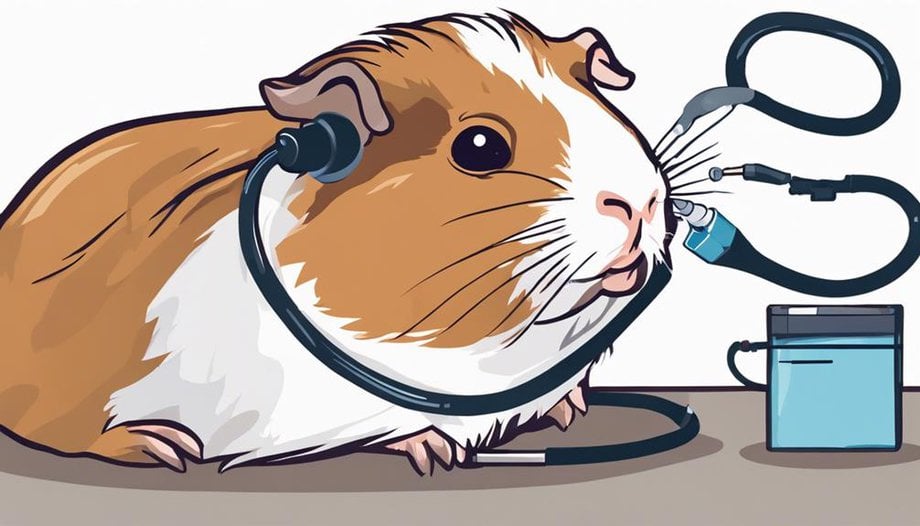
Guinea pigs are susceptible to respiratory infections, which can be caused by various factors such as poor ventilation and exposure to drafts. Owners can prevent these infections by ensuring their pets are housed in a well-ventilated area, free from sudden temperature changes, and maintaining a clean environment.
Regularly cleaning cages, providing proper bedding, and avoiding exposure to cigarette smoke are vital steps in safeguarding the respiratory health of guinea pigs.
Respiratory Infection Causes
To prevent respiratory infections in guinea pigs, maintaining a clean and well-ventilated living environment is essential. Guinea pigs are prone to respiratory issues, with causes ranging from infections to environmental factors.
Here are some key points to take into account:
- Common Triggers:
- Dust, mold, and ammonia from unclean cages can irritate the respiratory system.
- Sudden temperature changes or drafts in the living area can stress their delicate respiratory systems.
- Exposure to cigarette smoke or strong odors can also lead to respiratory problems.
Respiratory Infection Prevention
Maintaining a clean and well-ventilated living environment is key to preventing respiratory infections in guinea pigs. Poor air quality and dirty bedding can exacerbate the risk of these infections.
It's vital to monitor your guinea pig for respiratory infection symptoms such as sneezing, nasal discharge, labored breathing, or wheezing. If you notice any of these signs, prompt veterinary care is essential. Treatment options for respiratory infections may include antibiotics, nebulization therapy, or supportive care to help your guinea pig recover.
Additionally, guarantee your guinea pig's cage is cleaned regularly, provide fresh hay, and avoid exposing them to drafts or cigarette smoke. By being proactive in creating a clean and healthy environment, you can greatly reduce the chances of your furry friend developing respiratory issues.
Managing Dental Problems
Regular dental care is essential for ensuring the overall health and well-being of your guinea pig. Just like humans, guinea pigs can develop dental problems that, if left untreated, can lead to serious health issues. Here are three key points to keep in mind when managing your guinea pig's dental health:
- Dental Hygiene: Maintaining good dental hygiene is important for preventing dental diseases in guinea pigs. Regularly check your guinea pig's teeth for overgrowth, misalignment, or signs of infection.
- Dietary Habits: Providing a balanced diet rich in hay and fresh vegetables can help wear down your guinea pig's teeth naturally. Avoid sugary treats and opt for chew toys to promote healthy chewing habits.
- Regular Tooth Trimming: In some cases, guinea pigs may require professional tooth trimming to prevent overgrowth and ensure proper oral health. Consult with a veterinarian experienced in guinea pig care for appropriate tooth trimming procedures.
Parasite Prevention and Treatment
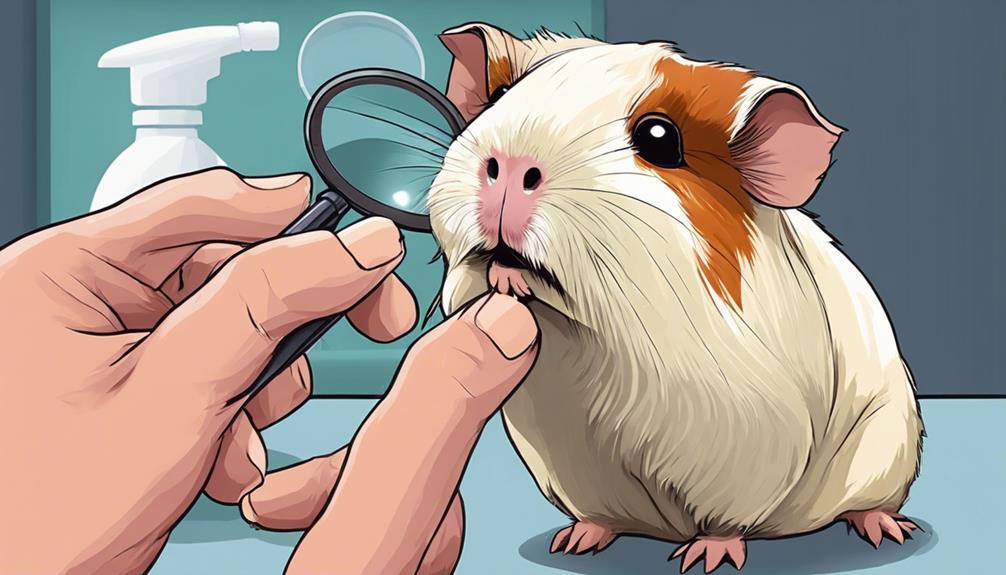
Ensuring your guinea pig remains free from parasites is important for maintaining their health and well-being. Parasites can cause discomfort, illness, and even lead to serious health issues if left untreated. Implementing parasite control measures and good hygiene practices is essential in preventing infestations. Regularly cleaning your guinea pig's living environment, providing fresh bedding, and grooming them can help reduce the risk of parasitic infections.
To further enhance parasite prevention, consider incorporating holistic treatments and natural remedies into your guinea pig's care routine. Some natural remedies like apple cider vinegar added to their drinking water or certain herbs known for their anti-parasitic properties can aid in keeping parasites at bay. Additionally, regular checkups with a veterinarian can help detect any signs of parasitic infestations early on, ensuring prompt treatment and effective management.
| Parasite Control | Hygiene Practices |
|---|---|
| Regular cleaning of cage | Providing fresh bedding |
| Natural remedies | Grooming your guinea pig regularly |
| Vet checkups | Monitoring for any signs of parasites |
Identifying Nutritional Deficiencies
To guarantee top health for your guinea pig, it's critical to be vigilant in identifying any potential nutritional deficiencies they may be experiencing. Guinea pigs, like humans, require a balanced diet to thrive. Here are three key strategies to help you identify and address any nutritional deficiencies in your furry companion:
- Observation: Watch for signs of deficiency such as dull coat, weight loss, lethargy, or changes in appetite. These could indicate a lack of essential nutrients in their diet.
- Consultation: Seek advice from a veterinarian experienced in guinea pig care. They can recommend nutritional supplements or diet adjustments tailored to your pet's specific needs.
- Research: Educate yourself on guinea pig dietary requirements. Understanding what foods are essential and harmful to your guinea pig can help you make informed decisions about their nutrition.
Monitoring Weight and Growth
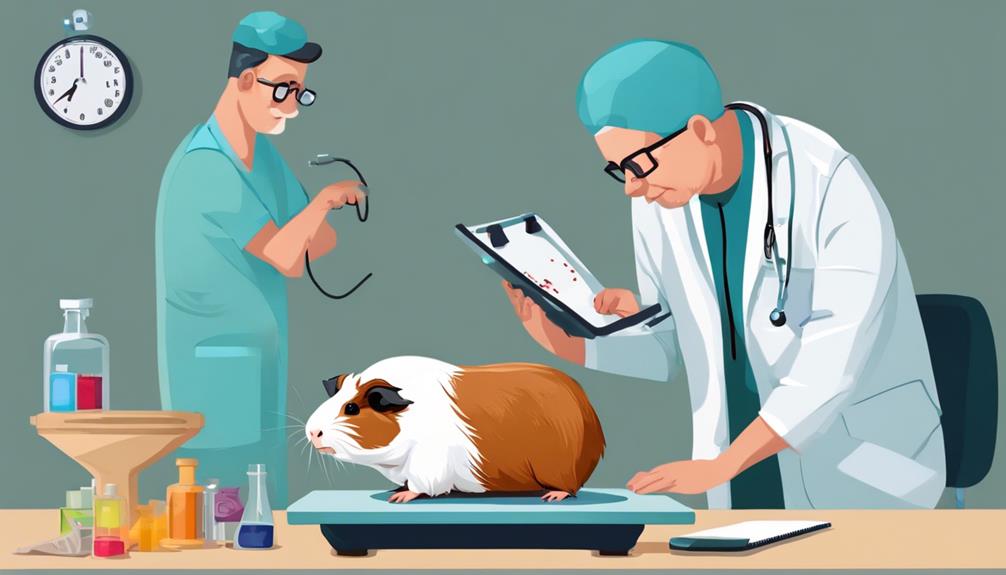
Monitoring your guinea pig's weight and growth is essential to ensuring their overall health and well-being. By keeping track of their growth milestones and weight trends, you can detect any potential health issues early on. Regularly weighing your guinea pig and comparing the results to standard growth charts can help you identify any abnormal fluctuations that may indicate underlying problems. If you notice any concerning patterns, it's critical to consult a veterinarian promptly.
In addition to monitoring weight and growth, dietary adjustments play a significant role in maintaining your guinea pig's health. Ensuring they receive a balanced diet rich in vitamin C, fiber, and other essential nutrients is key to supporting their growth and overall well-being. Regular health monitoring, including observing their eating habits and stool consistency, can also provide valuable insights into their overall health status.
Vaccinations for Disease Prevention
Regular vet checkups are essential for guinea pigs to receive timely vaccinations for disease prevention. Vaccinations play a critical role in protecting these small pets from various illnesses and ensuring their well-being.
Here are three essential points to ponder when it comes to vaccinations for guinea pigs:
- Proper care: Providing your guinea pig with the necessary vaccinations is a fundamental aspect of responsible pet ownership. Just like humans, these animals rely on vaccinations to strengthen their immune systems and ward off potentially harmful diseases.
- Immune system: Vaccinations work by stimulating the guinea pig's immune system to produce antibodies against specific diseases. This helps prime their bodies to fight off infections more effectively, reducing the likelihood of falling ill.
- Preventive measures: By staying up to date with vaccinations, you not only protect your guinea pig but also contribute to the overall health of the pet community. Preventing the spread of diseases through proper vaccination is a proactive step towards creating a safer environment for all beloved pets.
Frequently Asked Questions
How Often Should Guinea Pigs Typically Receive Vet Checkups?
Receiving regular vet checkups is crucial for guinea pigs. These checkups help in early detection of potential health issues, allowing for preventive care. Guinea pigs typically benefit from vet checkups at least once a year to guarantee their well-being.
Are There Any Specific Signs or Symptoms of Common Diseases That Guinea Pig Owners Should Be Aware Of?
Noticing weight loss, lethargy, hair loss, or sneezing in guinea pigs could signal common diseases. Owners should promptly seek veterinary care if these symptoms arise to make sure their furry companions receive proper treatment and care.
Can Respiratory Infections in Guinea Pigs Be Contagious to Other Pets in the Household?
In the delicate dance of pet health, unseen threads weave connections between creatures. Cross species transmission of respiratory infections in guinea pigs can pose risks to other household pets. Preventive vet care safeguards against potential health hazards.
What Are Some Common Dental Problems That Guinea Pigs May Experience?
Preventive care plays a crucial role in maintaining a guinea pig's dental health. Regular vet checkups help identify common dental problems early on. Nutritional balance and an exercise routine also contribute to overall well-being, ensuring a happy and healthy pet.
Are There Any Alternative Methods for Preventing Parasites in Guinea Pigs Besides Medication?
In the quest to shield guinea pigs from parasites, one can explore natural prevention methods. Embracing a holistic approach, focusing on hygiene, a balanced diet, and a clean living environment can fortify their well-being.



